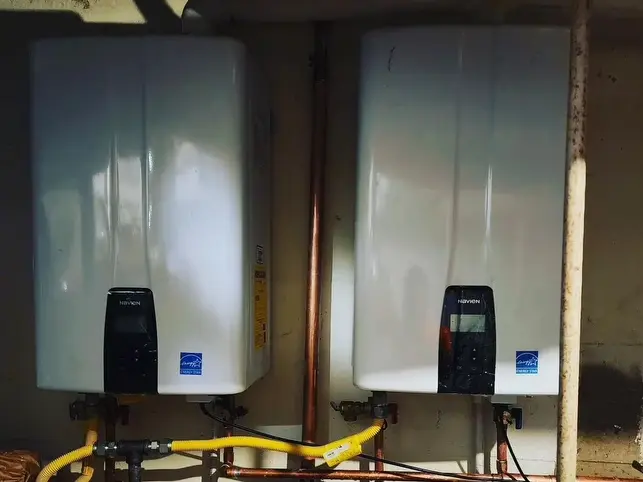Water Heater Repair or Replacement
Ensuring Comfort and Efficiency
When it comes to maintaining a comfortable home, few appliances are as essential as the water heater. Whether you rely on a traditional gas or electric water heater or have made the switch to a more modern tankless water heater, understanding the nuances of water heater repair or replacement can save you time, money, and discomfort.
Schedule Service Online
Easy as 1-2-3
Understanding Water Heater Repairs: A Guide for Homeowners
Water heaters are vital to any plumbing system, providing hot water for daily activities such as bathing, cooking, and cleaning. However, like any mechanical device, they can experience problems that require attention. Whether you face a minor issue or need a complete water heater repair or replacement, knowing the basics can help you make informed decisions before scheduling service with qualified professionals. At SWE Sewer Solutions, our team of experts are ready to quickly fix any water heater issues.
Common Water Heater Problems
Water heaters can encounter a variety of issues. Some common problems include:
Pilot Light Issues: If your water heater uses a gas burner, the pilot light may go out, preventing the burner from heating the water. Troubleshooting this issue often involves checking the igniter and ensuring proper airflow.
Pressure Problems: High or low pressure in your water heater tank can lead to inefficiencies or even safety hazards. A faulty valve might be responsible for pressure fluctuations, so it’s crucial to have a team of experts assess the situation.
Insulation Breakdown: Over time, the insulation around your water heater can wear out, causing heat loss and increased energy bills. Proper insulation is essential for efficiency.
Flush Requirements: Sediment buildup in the tank can affect the heater’s performance. Regular flushing is recommended to keep the system running smoothly and extend its lifespan.
The Importance of Professional Water Heater Service
When encountering water heater problems, consulting a qualified plumbing service is essential for effective water heater repair. Experts in the field can provide accurate estimates for both repairs and replacements, ensuring that all work is completed safely and efficiently. They possess the necessary equipment and expertise to tackle a range of issues, from valve replacements to burner repairs.
Additionally, scheduling regular water heater maintenance is a proactive way to prevent many common issues, ultimately saving you time and money on water heater repair. This maintenance routine includes important tasks such as checking the pilot light, flushing the tank, and thoroughly inspecting the entire plumbing system for leaks or wear. By prioritizing regular maintenance, you can extend the lifespan of your water heater and ensure its optimal performance.
Water Heater Installation and Replacement
If repairs are no longer viable, you may need to consider water heater installation or replacement. When investing in a new water heater, it’s essential to choose a unit that fits your needs. Experts can help you select the right size and type of tank, ensuring it meets your household’s demands.
Additionally, understand the warranties associated with your new unit. Many manufacturers offer warranties that cover certain repairs and replacements, providing peace of mind and protecting your investment.
Trusting Your Local Professionals
Building strong relationships with local plumbing services can significantly simplify the process of addressing plumbing issues, including critical water heater repair needs. Your community’s professionals are well-equipped to offer personalized service tailored to your specific requirements, ensuring high-quality workmanship every time.
For both businesses and homeowners, relying on a trusted team of experts for all plumbing needs—especially for water heater repair, water heater service, drain cleaning services, and routine maintenance—guarantees that your plumbing system operates efficiently.
Understanding the intricacies of water heater repairs is essential for timely intervention. Regular maintenance and prompt troubleshooting can prevent significant problems from arising down the line. If you notice any issues with your water heater, don’t hesitate to reach out to your local plumbing experts. Their extensive knowledge and experience will ensure that your water heater runs efficiently and safely for years to come. Schedule service today to keep your water heater in optimal condition!
A Comprehensive Guide to Different Types of Water Heaters
Water heaters are essential for delivering the hot water we depend on for showering, cleaning, and cooking. The right choice of water heater can greatly influence your home’s energy efficiency, performance, and overall comfort. With a variety of options available, understanding the differences between each type is crucial for making the best decision. In this article, we’ll delve into the most common types of water heaters, including gas water heaters, electric water heaters, tankless gas water heaters, tankless electric water heaters, and traditional hot water heaters, as well as the importance of water heater repair to ensure their longevity and efficiency.
In addition to choosing the right type of water heater, regular maintenance is key to ensuring its optimal performance. This includes timely water heater repair or replacement when necessary. Ignoring signs of wear or inefficiency can lead to more significant issues down the line, such as leaks or decreased heating capacity. By staying proactive with repairs and considering replacement when repairs become too costly, you can maintain a reliable supply of hot water in your home while also maximizing energy efficiency. Understanding when to repair versus when to replace your water heater can save you money and hassle in the long run.
1. Conventional Gas Water Heater
A gas water heater is one of the most traditional and widely used types of water heaters. These systems use natural gas or propane to heat water stored in a tank, which is then distributed throughout your home. Here are the key features:
- Cost-Effective Operation: Gas water heaters are generally more cost-effective to operate compared to electric water heaters, especially in areas where natural gas is cheaper than electricity.
- Faster Heating: Gas models heat water faster than electric water heaters, making them a popular choice for households with higher hot water demands.
- Consistent Hot Water Supply: With a tank-style gas water heater, hot water is stored and ready for use, providing a continuous supply.
While gas water heaters are efficient, they require proper venting to remove combustion gases, which may require professional installation.
2. Conventional Electric Water Heater
An electric water heater operates by using electrical resistance elements to heat water stored in a tank. These water heaters are another popular option for residential use and come with their own advantages:
- Ease of Installation: Electric water heaters do not require venting, making installation easier and more flexible.
- Widespread Availability: Electricity is widely available, making electric water heaters accessible in nearly all locations.
- Lower Upfront Costs: Electric water heaters often have lower upfront installation costs than gas models.
However, electric water heaters can have higher operating costs, depending on electricity rates, and may take longer to heat water compared to gas water heaters.
3. Tankless Gas Water Heater
A tankless gas water heater is a modern solution that heats water on demand rather than storing it in a tank. These units are becoming increasingly popular due to their energy efficiency and space-saving design. Key benefits include:
- Energy Efficiency: Since tankless gas water heaters only heat water when needed, they eliminate the standby energy losses associated with storing hot water in a tank.
- Unlimited Hot Water Supply: These systems can provide a continuous flow of hot water, ideal for large households or homes with high water usage.
- Compact Design: Without the need for a bulky storage tank, tankless gas water heaters take up significantly less space.
Despite the higher upfront costs and the need for proper venting, tankless gas water heaters can offer long-term energy savings and efficiency.
4. Electric Tankless Water Heater
A tankless electric water heater offers the same on-demand hot water as its gas counterpart, but it relies on electricity to heat the water. These units have their own set of advantages:
- No Gas Line Required: Tankless electric water heaters are ideal for homes without access to natural gas or propane.
- Lower Initial Cost: Generally, tankless electric units are less expensive to install than tankless gas models, as they don’t require venting.
- Compact and Energy-Efficient: Like tankless gas models, these units are space-efficient and only heat water as needed, reducing energy consumption.
However, they may not be suitable for homes with high hot water demand, as their heating capacity is generally lower than that of gas models.
5. Traditional Hot Water Heater
The most common type of water heater in the United States is a conventional storage-tank water heater. When people refer to a hot water heater, they typically mean a traditional tank-style water heater, which can be powered by gas, electricity, or other fuels. These units store a large volume of heated water that is ready for use whenever you need it.
- Gas Hot Water Heaters: These are powered by natural gas or propane and offer faster heating times, making them suitable for homes with larger families or frequent water usage.
- Electric Hot Water Heaters: These use electric elements to heat the water and are known for their ease of installation and accessibility in areas without gas lines.
Traditional hot water heaters are dependable but can consume more energy than tankless models because they must maintain water at a constant temperature, even when not in use. Selecting the right water heater for your home involves considering various factors, such as your energy source, household size, and water usage habits. Gas water heaters are quick and cost-effective, while electric water heaters are easier to install and widely accessible.
For those seeking energy efficiency and an endless supply of hot water, tankless gas, and tankless electric water heaters are excellent modern options. Additionally, regular water heater repair is essential to keep your system running efficiently and to extend its lifespan. Understanding the pros and cons of each type will help you make an informed decision, ensuring your home has a reliable source of hot water for years to come.

Signs You Need Water Heater Repair
Many homeowners may not realize when their water heater is in distress. Here are some common signs that indicate you may need water heater repair:
Lack of Hot Water: One of the most obvious signs is the absence of hot water. If you find yourself taking cold showers, it’s time to investigate the issue.
Strange Noises: If your water heater is making unusual sounds like banging or popping, it could be a sign of sediment buildup. This can hinder its efficiency and may require professional water heater repair or replacement.
Leaks: Any water pooling around your water heater is a red flag. Leaks can lead to more significant water damage if not addressed promptly.
Discolored Water: If your hot water has a rusty or discolored appearance, it could indicate corrosion inside your tank, signaling the need for repair or even replacement.
Fluctuating Water Temperatures: Inconsistent hot water temperatures can indicate a failing thermostat or heating element.
Water Heater Replacement: When Is It Time?
While regular water heater repair can extend the life of your unit, there comes a time when replacement is the best option. Here are some considerations:
Age of the Water Heater: Most traditional water heaters last about 8-12 years. If your unit is nearing this age, it might be more cost-effective to consider water heater replacement.
Frequent Repairs: If you find yourself calling for water heater repair frequently, it may indicate that your unit is nearing the end of its lifespan.
Energy Efficiency: Newer models, including electric tankless water heaters and gas tankless water heaters, are often much more energy-efficient than older models. Upgrading could save you money on energy bills in the long run.
Choosing Between Gas and Electric Water Heaters
When it comes to water heater options, homeowners typically choose between gas and electric models. Here’s a quick breakdown of their differences:
Gas Water Heaters: Generally, gas water heaters have lower operational costs and can heat water faster than electric models. However, they may require venting and a gas line, which can complicate installation.
Electric Water Heaters: These units are easier to install and don’t require venting. They may have higher operational costs, but they can be more efficient in certain situations, especially with tankless options.
Tankless Water Heaters: A Modern Solution
Tankless water heaters are gaining popularity for their ability to provide on-demand hot water without the bulk of a traditional tank. Here are some advantages of opting for a tankless model:
Energy Efficiency: Tankless water heaters only heat water when needed, which can significantly reduce energy consumption.
Space Saving: Their compact design makes them ideal for smaller homes or apartments.
Longer Lifespan: Generally, tankless water heaters last longer than traditional units, often exceeding 20 years with proper maintenance.
A Little About Us
SWE Sewer Solutions uses the latest in water heater repair technologies. Whether it’s a simple leak, a sewer drain clog, or a malfunctioning toilet, our skilled technicians have the right tools and knowledge to tackle any plumbing problems. As a home or business owner, you may someday need to replace your sewer lines or connect your home’s sewer system to the city sewage if you currently have a septic system installed. SWE Sewer Solutions Construction and Engineering offers these types of services.
We are your bonded sewer contractor, servicing the Southern California area since 1980. Providing both residential and commercial services and much more. Our expert technicians are trained and certified to complete any water heater repair or replacement services. We provide 24/7 emergency services to serve you during those difficult times when many other plumbers are closed. Call us today if you need more information or have any questions about water heater repair or replacement.
We are a family-owned and operated plumbing company providing residential and commercial sewer services to the Southern California area. We look forward to delivering the best customer service care, and we take pride in providing professional, affordable water heater repair services. We look forward to servicing you. Schedule an appointment today for a free in-house estimate, or if you prefer, message us online. Ask about a free quote.

